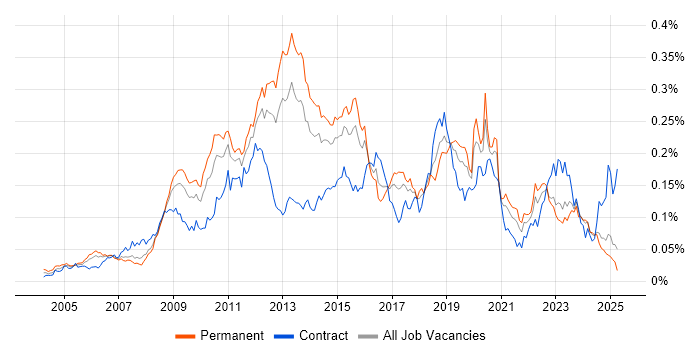iSCSI
UK > UK excluding London
The table below provides summary statistics for permanent job vacancies advertised in the UK excluding London requiring iSCSI skills. It includes a benchmarking guide to the annual salaries offered in vacancies that cited iSCSI over the 6 months leading up to 31 May 2025, comparing them to the same period in the previous two years.
| 6 months to 31 May 2025 |
Same period 2024 | Same period 2023 | |
|---|---|---|---|
| Rank | 563 | 695 | 711 |
| Rank change year-on-year | +132 | +16 | +83 |
| Permanent jobs citing iSCSI | 16 | 67 | 37 |
| As % of all permanent jobs advertised in the UK excluding London | 0.040% | 0.089% | 0.065% |
| As % of the Communications & Networking category | 0.22% | 0.68% | 0.34% |
| Number of salaries quoted | 14 | 61 | 36 |
| 10th Percentile | £37,575 | £36,250 | £38,875 |
| 25th Percentile | £37,750 | £42,500 | £39,000 |
| Median annual salary (50th Percentile) | £46,000 | £51,000 | £42,500 |
| Median % change year-on-year | -9.80% | +20.00% | -15.00% |
| 75th Percentile | £53,063 | £58,750 | £52,500 |
| 90th Percentile | £69,250 | £76,250 | £63,750 |
| UK median annual salary | £46,000 | £51,000 | £43,875 |
| % change year-on-year | -9.80% | +16.24% | -12.25% |
All Communications and Computer Networking Skills
UK excluding London
iSCSI falls under the Communications and Computer Networking category. For comparison with the information above, the following table provides summary statistics for all permanent job vacancies requiring communications or computer networking skills in the UK excluding London.
| Permanent vacancies with a requirement for communications or computer networking skills | 7,144 | 9,866 | 10,804 |
| As % of all permanent jobs advertised in the UK excluding London | 18.00% | 13.17% | 18.85% |
| Number of salaries quoted | 3,355 | 7,111 | 4,601 |
| 10th Percentile | £23,504 | £25,750 | £26,250 |
| 25th Percentile | £25,087 | £31,250 | £32,000 |
| Median annual salary (50th Percentile) | £35,000 | £44,000 | £45,000 |
| Median % change year-on-year | -20.45% | -2.22% | -5.26% |
| 75th Percentile | £57,000 | £58,750 | £61,250 |
| 90th Percentile | £71,250 | £68,750 | £75,000 |
| UK median annual salary | £42,500 | £47,500 | £50,500 |
| % change year-on-year | -10.53% | -5.94% | -3.81% |
iSCSI
Job Vacancy Trend in the UK excluding London
Job postings citing iSCSI as a proportion of all IT jobs advertised in the UK excluding London.

iSCSI
Salary Trend in the UK excluding London
3-month moving average salary quoted in jobs citing iSCSI in the UK excluding London.
iSCSI
Salary Histogram in the UK excluding London
Salary distribution for jobs citing iSCSI in the UK excluding London over the 6 months to 31 May 2025.
iSCSI
Job Locations in the UK excluding London
The table below looks at the demand and provides a guide to the median salaries quoted in IT jobs citing iSCSI within the UK excluding London region over the 6 months to 31 May 2025. The 'Rank Change' column provides an indication of the change in demand within each location based on the same 6 month period last year.
| Location | Rank Change on Same Period Last Year |
Matching Permanent IT Job Ads |
Median Salary Past 6 Months |
Median Salary % Change on Same Period Last Year |
Live Jobs |
|---|---|---|---|---|---|
| South East | +71 | 10 | £46,000 | -1.08% | 10 |
| Midlands | +55 | 3 | £38,500 | -14.44% | 3 |
| East Midlands | - | 3 | £38,500 | - | 3 |
| North of England | +27 | 2 | - | - | 1 |
| Yorkshire | - | 2 | - | - | |
| East of England | +45 | 1 | £50,000 | +33.33% | 3 |
| iSCSI UK |
|||||
iSCSI
Co-occurring Skills and Capabilities in the UK excluding London by Category
The follow tables expand on the table above by listing co-occurrences grouped by category. The same employment type, locality and period is covered with up to 20 co-occurrences shown in each of the following categories:
|
|
|||||||||||||||||||||||||||||||||||||||||||||||||||||||||||||||||||||||||||||||||||||||||||||||||||
|
|
|||||||||||||||||||||||||||||||||||||||||||||||||||||||||||||||||||||||||||||||||||||||||||||||||||
|
|
|||||||||||||||||||||||||||||||||||||||||||||||||||||||||||||||||||||||||||||||||||||||||||||||||||
|
|
|||||||||||||||||||||||||||||||||||||||||||||||||||||||||||||||||||||||||||||||||||||||||||||||||||
|
|
|||||||||||||||||||||||||||||||||||||||||||||||||||||||||||||||||||||||||||||||||||||||||||||||||||
|
|
|||||||||||||||||||||||||||||||||||||||||||||||||||||||||||||||||||||||||||||||||||||||||||||||||||
|
|
|||||||||||||||||||||||||||||||||||||||||||||||||||||||||||||||||||||||||||||||||||||||||||||||||||
|
|
|||||||||||||||||||||||||||||||||||||||||||||||||||||||||||||||||||||||||||||||||||||||||||||||||||
|
||||||||||||||||||||||||||||||||||||||||||||||||||||||||||||||||||||||||||||||||||||||||||||||||||||
